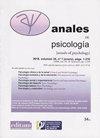新冠肺炎大流行中心理困扰、生活意义和生活满意度之间的关系
IF 1.3
4区 心理学
Q3 PSYCHOLOGY
引用次数: 2
摘要
在新冠疫情期间,对感染的恐惧、失去亲属以及为防止污染而采取的措施(如上锁、隔离、空间距离等)都增加了抑郁、焦虑和压力的风险。在这项研究中,在大流行期间感染和未感染新型冠状病毒的个人中,探讨了心理痛苦、生活意义和生活满意度之间的关系。这项研究是第一项同时研究这些变量的研究。样本包括687名18岁以上的成年人(平均=30.51岁)。结果表明,生活满意度高的成年人心理痛苦程度较低,生活更有意义,追求的意义较小。心理痛苦与寻找生命意义呈正相关,与生命意义的存在呈负相关。此外,抑郁症状和生活中意义的存在是生活满意度的重要预测因素。在新冠疫情期间,对感染的恐惧、失去家人以及为防止污染而采取的措施(如关闭、隔离、空间隔离等)增加了抑郁、焦虑和压力的风险。在这项研究中,探讨了大流行期间感染和未感染新型冠状病毒的人的心理痛苦、生活意义和生活满意度之间的关系。这项研究是第一项同时研究这些变量的研究。样本由687名18岁以上的成年人(平均=30.51岁)组成。结果表明,生活满意度高的成年人心理痛苦程度较低,生活更有意义,对意义的追求较少。心理不适与对生活意义的追求呈正相关,与生活意义的存在呈负相关。此外,抑郁和生活中有意义的存在是生活满意度的重要预测因素。本文章由计算机程序翻译,如有差异,请以英文原文为准。
The relationship between psychological distress, meaning in life, and life satisfaction in the COVID-19 pandemic
During the COVID-19 pandemic, the fear of being infected, losing relatives, and measures taken to prevent contamination (e.g., lockdowns, quarantining, spatial distancing, etc.) have all increased the risk of depression, anxiety and stress. In the present study, the relationship between psychological distress, meaning in life, and life satisfaction was explored among individuals who were infected and not infected with COVID-19 during the pandemic. The present study is the first to examine these variables simultaneously. The sample comprised 687 adult individuals over the age of 18 years (mean=30.51 years). Results indicated that adult individuals with high life satisfaction had lower levels of psychological distress, find life more meaningful, and seek meaning less. Psychological distress was positively related with the search for meaning in life and negatively related with the existence of meaning in life. Moreover, depressive symptoms and the existence of meaning in life were significant predictors of life satisfaction.
Durante la pandemia de COVID-19, el miedo a infectarse, perder a familiares y las medidas tomadas para prevenir la contaminación (por ejemplo, cierres, cuarentenas, distanciamiento espacial, etc.) han aumentado el riesgo de depresión, ansiedad y estrés. En el presente estudio, se exploró la relación entre la angustia psicológica, el significado de la vida y la satisfacción con la vida entre personas infectadas y no infectadas con COVID-19 durante la pandemia. El presente estudio es el primero en examinar estas variables simultáneamente. La muestra estuvo compuesta por 687 adultos mayores de 18 años (media = 30,51 años). Los resultados indicaron que las personas adultas con una alta satisfacción con la vida tenían niveles más bajos de angustia psicológica, encontraban la vida más significativa y buscaban menos el significado. El malestar psicológico se relacionó positivamente con la búsqueda de sentido en la vida y negativamente con la existencia de sentido en la vida. Además, la depresión y la existencia de sentido en la vida fueron predictores significativos de la satisfacción con la vida.
求助全文
通过发布文献求助,成功后即可免费获取论文全文。
去求助
来源期刊

Anales De Psicologia
医学-心理学
CiteScore
3.30
自引率
5.90%
发文量
57
审稿时长
4-8 weeks
期刊介绍:
Anales de Psicologia / Annals of Psychology is a multidisciplinary journal of the various thematic areas of scientific psychology. It publishes original research articles and theoretical review in any of its basic, applied and methodological areas included within psychology.
Publishing, financing, marketing and distribution corresponds Editum: Editions of the University of Murcia (Spain). The organizational guidelines and editorial policies come from the Editorial Team (elected for four years by the Areas and / or Departments of Psychology at the University of Murcia) and the Editorial Board, composed of scholars and experts from different universities and institutions national and international. It is published in print (ISSN: 0212-9728) since 1984 and in Internet publishing (web) (ISSN: 1695-2294) since 2000. Available online full text in pdf from the vol. 1 1984.
Anales de Psicologia / Annals of Psychology maintains a system of exchange with other journals and publications of psychology in the world. Through an free exchange agreement with their respective publishers or entities responsible for editing, these journals and publications are received at the University of Murcia (Biblioteca "Luis Vives", near the Faculty of Psychology) and in return, our journal is sent to libraries and educational and research institutions such centers responsible for editing.
 求助内容:
求助内容: 应助结果提醒方式:
应助结果提醒方式:


